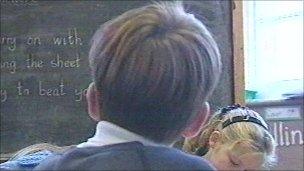Summer-born hit by school streaming
- Published

Children can be grouped by ability within their class or school year
Children born in the summer who are put in to ability streams when young can suffer educationally as a result, academics say.
By the age of seven, those born in September are three times as likely as those born in August to be in the top streams.
It is widely known that summer-born children do less well academically than those born earlier in the school year.
But researchers say streaming can be part of the problem.
A study by the Institute of Education at London University found that by the age of seven, just over 70% of the children born in September were in a top stream, compared with fewer than 30% of those born in August.
About 30% of August-born children were in the bottom stream, compared with about 10% of September-born youngsters.
The researchers - who looked just at data for England - also found that grouping younger children by ability even within a class could affect them.
Early setting
Study author Tammy Campbell said: "If teachers place younger pupils early in their school career in lower ability groupings, and older pupils in higher groupings, this hasty (and potentially premature) sorting may have a significant impact on subsequent differences in educational attainment."
The research was based on 5,000 children in England who are being followed as part of what is known as the Millennium cohort study.
Streaming is generally defined as when a whole year group is split on ability across the board for all lessons.
"Setting" is when children are put in groups on ability for different subjects, so a child might be in a top set for maths but a lower set for English, for example.
Grouping children by ability within a class or a year is common, even early on in primary schools.
The study found that 97% of the children in the study were grouped by ability by the time they were seven - within their year, class, or both.
About a third were grouped within their year for English or maths and nearly 80% were grouped within their class for all or most lessons.
Bullied
The report said previous research had shown that younger children tended to do less well academically than their older classmates and that summer-born youngsters were also likely to be less confident, more frequently diagnosed with special educational needs and more likely to be bullied.
It said research also suggests grouping by ability had a bad effect on children in the lowest groups.
This is thought to be because behaviour of both pupils and teachers can be affected and that such children might get fewer opportunities and be demotivated.
The arguments for grouping, streaming and setting are that children will learn more and be more interested if lessons are pitched at the right level for them and that they will be bored and possibly disruptive if they are not.
Academics also say it is easier to teach children if they are of a similar ability.
A report from the Institute for Education last year found similar levels of streaming at age seven in England, Wales and Scotland but that schools in Northern Ireland were less likely to do this.
In England, children have to be in full-time education at least by the term after their fifth birthday and the main starting point is September. In practice, this means some start soon after their fourth birthday and could be in a class with children almost a year older than them - the September-born children.
In Scotland, the school year starts in August and children start school some time between the ages of four and a half and five and a half, depending on when their birthday is.
A school year group is made up of children born between the beginning of March in one year and the end of February the following year.
- Published15 June 2011